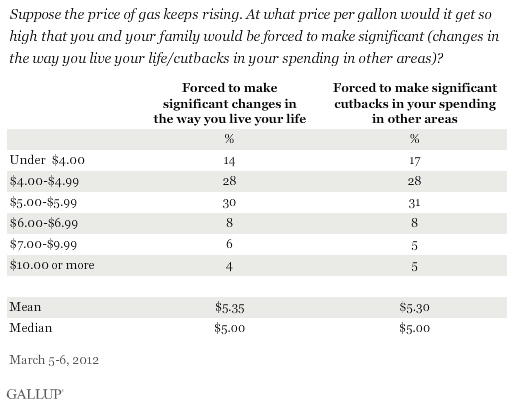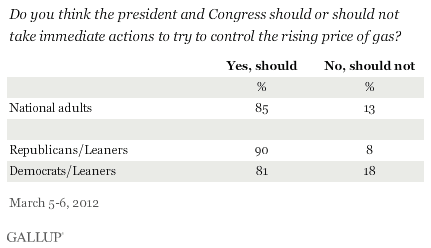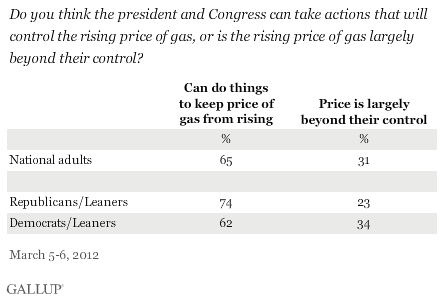PRINCETON, NJ -- Americans on average say gas prices of $5.30 to $5.35 per gallon are the tipping point that would make them cut back on spending in other areas or make significant changes in the way they live their lives.

These responses are based on questions included in Gallup interviewing conducted March 5-6. The price of a gallon of regular gas has jumped over the last several months to an average of $3.76 on March 8 from an average below $3.35 in November, according to the AAA Daily Fuel Gauge report.
The two questions about the implications of the rising price of gas on spending and lifestyle changes were asked of two separate random split samples of about 500 respondents each. Americans appear to make little distinction about the impact of gas prices, whether the question is worded as "significant cutbacks in your spending in other areas" or "significant changes in the way you live your life."
The responses varied widely, with 14% to 17% of Americans saying a price of less than $4 per gallon would be high enough to cause them to change their lifestyle or cut back on spending elsewhere. Another 28% each say a price point in the $4 range would cause these changes. The overall average "tipping point" price of roughly $5.30, however, suggests there is room for a considerably greater increase in gas prices before Americans say prices will begin to have widespread, serious consequences on their spending and lifestyle patterns.
Americans Want President and Congress to Take Action on Gas Prices
Despite the finding that the price of gas is apparently not yet causing significant disruptions in Americans' lives, most Americans still want their elected representatives in Washington to address the issue. Eighty-five percent say the president and Congress should "take immediate actions to try to control the rising price of gas."

Large majorities of both Republicans and Democrats say the president and Congress should take such actions, with Republicans and Republican-leaning independents slightly more inclined in that direction than Democrats and Democratic-leaning independents.
At the same time, a somewhat lower 65% of Americans believe that the president and Congress can in fact take actions that would control the rising price of gas, while 31% say the rising price of gas is largely beyond politicians' control.

Here again, Republicans are slightly more likely than Democrats to say politicians in Washington can do something about the price of gas.
President Obama may have been cognizant of these attitudes when, in his March 6 press conference, he listed a number of initiatives his administration has taken to attempt to curb gas prices, including doubling fuel efficiency standards for cars, developing clean energy technologies, and addressing potential speculation in the oil markets.
Republican presidential candidates are also sensitive to Americans' call for Washington to do something about the price of gas. One GOP candidate -- Newt Gingrich -- has gone so far as to proclaim that if elected president, he would bring gas prices back down to $2.50 a gallon.
Implications
The price of gas has yet to reach a level at which average Americans say they would have to change their lifestyles significantly or cut back on spending in other areas. It appears that a price of roughly $5.30 a gallon would be the tipping point at which the cost of gas would begin to have more widespread impact on consumer behavior.
Gas is far below $5 a gallon now, on average, across America, but there are reports that $5-per-gallon prices in many locations would not be out of the question by summer. If so, and if prices stay high, that could present problems for President Obama's re-election chances, which -- as is the case for all incumbents -- are significantly correlated with voter perceptions of the economy.
The president in a recent press conference spoke at length about his administration's efforts to control the price of gas, even though he admitted that he held no "silver bullet" that would do so in short order. These types of pre-emptive public statements are well advised, based on the finding that most Americans want the president and Congress to take action to control the price of gas, and that a majority feel there are things these elected officials can do to accomplish this.
Survey Methods
Results for the questions included in this Gallup poll analysis are based on telephone interviews conducted March 5-6, 2012, on the Gallup Daily tracking survey, with random samples of approximately 500 adults each, aged 18 and older, living in all 50 U.S. states and the District of Columbia.
For results based on these random samples of national adults, one can say with 95% confidence that the maximum margin of sampling error is ±5 percentage points.
Interviews are conducted with respondents on landline telephones and cellular phones, with interviews conducted in Spanish for respondents who are primarily Spanish-speaking. Each sample includes a minimum quota of 400 cell phone respondents and 600 landline respondents per 1,000 national adults, with additional minimum quotas among landline respondents by region. Landline telephone numbers are chosen at random among listed telephone numbers. Cell phone numbers are selected using random-digit-dial methods. Landline respondents are chosen at random within each household on the basis of which member had the most recent birthday.
Samples are weighted by gender, age, race, Hispanic ethnicity, education, region, adults in the household, and phone status (cell phone only/landline only/both, cell phone mostly, and having an unlisted landline number). Demographic weighting targets are based on the March 2011 Current Population Survey figures for the aged 18 and older non-institutionalized population living in U.S. telephone households. All reported margins of sampling error include the computed design effects for weighting and sample design.
View methodology, full question results, and trend data.
In addition to sampling error, question wording and practical difficulties in conducting surveys can introduce error or bias into the findings of public opinion polls.
For more details on Gallup's polling methodology, visit www.gallup.com.
